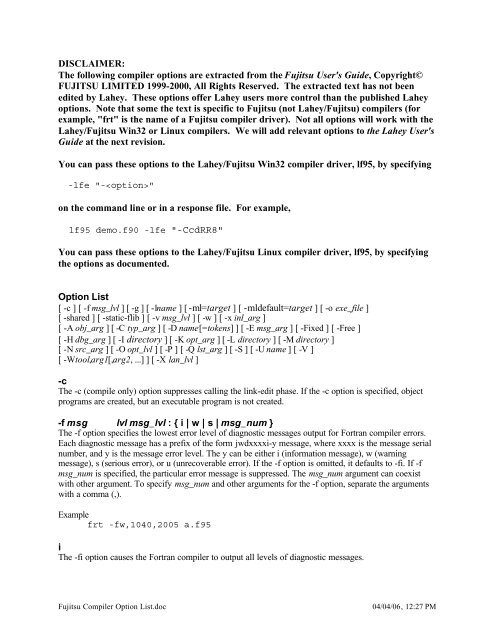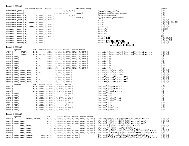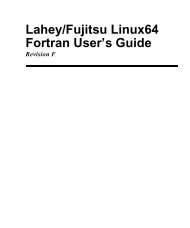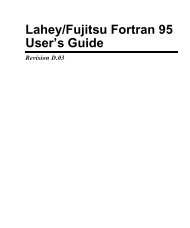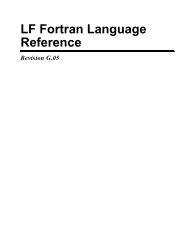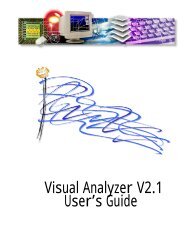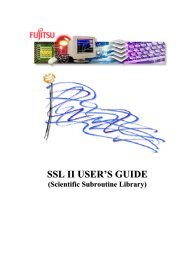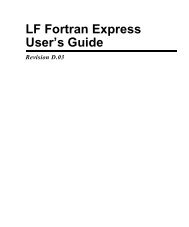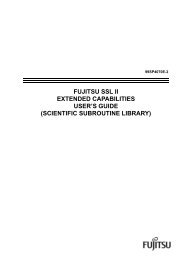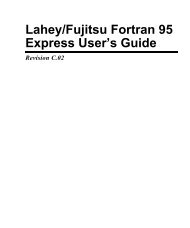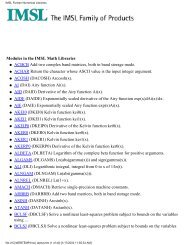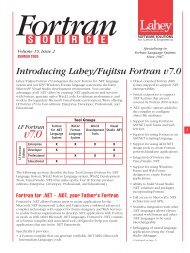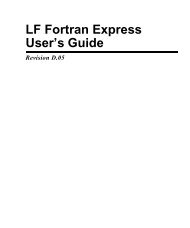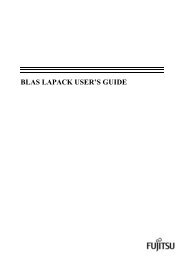Fujitsu Compiler Options - Lahey Computer Systems
Fujitsu Compiler Options - Lahey Computer Systems
Fujitsu Compiler Options - Lahey Computer Systems
Create successful ePaper yourself
Turn your PDF publications into a flip-book with our unique Google optimized e-Paper software.
DISCLAIMER:<br />
The following compiler options are extracted from the <strong>Fujitsu</strong> User's Guide, Copyright©<br />
FUJITSU LIMITED 1999-2000, All Rights Reserved. The extracted text has not been<br />
edited by <strong>Lahey</strong>. These options offer <strong>Lahey</strong> users more control than the published <strong>Lahey</strong><br />
options. Note that some the text is specific to <strong>Fujitsu</strong> (not <strong>Lahey</strong>/<strong>Fujitsu</strong>) compilers (for<br />
example, "frt" is the name of a <strong>Fujitsu</strong> compiler driver). Not all options will work with the<br />
<strong>Lahey</strong>/<strong>Fujitsu</strong> Win32 or Linux compilers. We will add relevant options to the <strong>Lahey</strong> User's<br />
Guide at the next revision.<br />
You can pass these options to the <strong>Lahey</strong>/<strong>Fujitsu</strong> Win32 compiler driver, lf95, by specifying<br />
-lfe "-"<br />
on the command line or in a response file. For example,<br />
lf95 demo.f90 -lfe "-CcdRR8"<br />
You can pass these options to the <strong>Lahey</strong>/<strong>Fujitsu</strong> Linux compiler driver, lf95, by specifying<br />
the options as documented.<br />
Option List<br />
[ -c ] [ -f msg_lvl ] [ -g ] [ -lname ] [ -ml=target ] [ -mldefault=target ] [ -o exe_file ]<br />
[ -shared ] [ -static-flib ] [ -v msg_lvl ] [ -w ] [ -x inl_arg ]<br />
[ -A obj_arg ] [ -C typ_arg ] [ -D name[=tokens] ] [ -E msg_arg ] [ -Fixed ] [ -Free ]<br />
[ -H dbg_arg ] [ -I directory ] [ -K opt_arg ] [ -L directory ] [ -M directory ]<br />
[ -N src_arg ] [ -O opt_lvl ] [ -P ] [ -Q lst_arg ] [ -S ] [ -U name ] [ -V ]<br />
[ -Wtool,arg1[,arg2, ...] ] [ -X lan_lvl ]<br />
-c<br />
The -c (compile only) option suppresses calling the link-edit phase. If the -c option is specified, object<br />
programs are created, but an executable program is not created.<br />
-f msg lvl msg_lvl : { i | w | s | msg_num }<br />
The -f option specifies the lowest error level of diagnostic messages output for Fortran compiler errors.<br />
Each diagnostic message has a prefix of the form jwdxxxxi-y message, where xxxx is the message serial<br />
number, and y is the message error level. The y can be either i (information message), w (warning<br />
message), s (serious error), or u (unrecoverable error). If the -f option is omitted, it defaults to -fi. If -f<br />
msg_num is specified, the particular error message is suppressed. The msg_num argument can coexist<br />
with other argument. To specify msg_num and other arguments for the -f option, separate the arguments<br />
with a comma (,).<br />
Example<br />
frt -fw,1040,2005 a.f95<br />
i<br />
The -fi option causes the Fortran compiler to output all levels of diagnostic messages.<br />
<strong>Fujitsu</strong> <strong>Compiler</strong> Option List.doc<br />
04/04/06, 12:27 PM
w<br />
The -fw option causes the Fortran compiler to output diagnostic messages only for error levels w, s, and<br />
u.<br />
s<br />
The -fs option causes the Fortran compiler to output diagnostic messages only for error levels s and u.<br />
msg_num<br />
The -fmsg_num suppresses particular information and warning diagnostic messages specified by the<br />
msg_num argument. The msg_num argument is the four-digit message number; more than one msg_num<br />
may be specified. The msg_num argument can coexist with all of the options, but is ignored when -fs is<br />
specified.<br />
-g<br />
The -g option generates debugging information in object programs. This information is used by the<br />
debugger. The user can perform source-level debugging of programs compiled this way. If both the -g and<br />
-O options are specified, the -O option is ignored.<br />
The -g option affects only Fortran source files compiled by the frt command. It does not affect .o, .s, or<br />
other files.<br />
-lname<br />
The -l option searches the library libname.so or libname.a. The position of this option within the<br />
command line is important. This is because libraries are searched for in the order in which the other<br />
libraries and object files appear within the command line. This option and its argument are passed to the<br />
linker.<br />
-ml=target target: { cdecl | frt }<br />
Changes the external procedure name according to target. ‘cdecl’ or ‘frt’ can be specified for target on<br />
the Linux system.<br />
-mldefault=target target: { cdecl | frt }<br />
Changes the default external procedure name according to target. ‘cdecl’ or ‘frt’ can be specified for<br />
target on the Linux system.<br />
-o exe_file<br />
If the -c option is not specified, the -o option specifies the file name of the executable program. This<br />
information is specified as the argument exe_file. If both the -o and -c options are specified, an object<br />
program is created with the name exe_file. If both the -o and -S options are specified, an assembly<br />
program is created with the name exe_file.<br />
-shared<br />
If the -shared option is specified, create a shared library. The -shared option is used at liking time.<br />
-static-flib<br />
The -static-flib option specify to link Fortran Library statically. Dynamic linking for Fortran Library is<br />
default. The -static-flib option is used at liking time.<br />
<strong>Fujitsu</strong> <strong>Compiler</strong> Option List.doc<br />
04/04/06, 12:27 PM
-v msg_lvl msg_lvl : { 90o | 95d | 95e | 95o | 95s }<br />
The -v option diagnoses whether a source code conforms to a specific Fortran standard. More then one of<br />
these options may be specified, separated by commas.<br />
90o<br />
The -v90o option issues diagnostic messages if the source code contains any obsolescent features in<br />
Fortran 90.<br />
95d<br />
The -v95d option issues diagnostic messages if the source code contains any deleted features in Fortran<br />
95.<br />
95e<br />
The -v95e option issues diagnostic messages if the source code contains any Fortran 95 features not also<br />
in Fortran 90.<br />
95o<br />
The -v95o option issues diagnostic messages if the source code contains any obsolescent features in<br />
Fortran 95.<br />
95s<br />
The -v95s option issues diagnostic messages if the source code contains any nonstandard features, other<br />
than decremental features in Fortran 95.<br />
-w<br />
The -w option compiles source programs with the length of each line extended to 255 characters in fixed<br />
source form.<br />
-x inl_arg inl_arg : { - | pgm_nm[, pgm_nm[, ...]] | stm_no | dat_szK }<br />
The -x option creates an object program by applying inline expansion of user-defined external and<br />
internal procedures at the point where they are referenced. The -x option improves the execution<br />
performance of an object program above the level obtained by using the -K option. If the -x option is<br />
specified with the -O0 option, the -x option is ignored. To specify more than one argument for the -x<br />
option, separate the arguments with a comma (,).<br />
These optimization functions increase the time and memory needed for compilation. Also, the more<br />
validating the optimization function has to do, the greater will be the size of the object program. To<br />
determine whether these optimization functions were applied, specify the option -Ei.<br />
An external procedure in the same input source file as the program unit calling the procedure and internal<br />
procedure are subject to these optimization functions. The optimization is not applied to references to<br />
procedures in other source files.<br />
In this version of the compiler, there is no attempt to inline module procedures.<br />
-<br />
The -x- option creates an object program by applying inline expansion of user-defined external and<br />
internal procedures having 30 or fewer executable statements. These statements are expanded at the<br />
reference point.<br />
<strong>Fujitsu</strong> <strong>Compiler</strong> Option List.doc<br />
04/04/06, 12:27 PM
The -x- option must not be used with any other -x option.<br />
pgm_nm[, pgm_nm[, ...]]<br />
The -xpgm_nm[, pgm_nm[, ...]] applies inline expansion for only those user-defined external and internal<br />
procedures specified in pgm_nm arguments. Specifying only the names of frequently called procedures<br />
can significantly reduce compilation time and memory requirements. Use a comma to separate pgm_nm<br />
from other arguments of the -x option specified at the same time.<br />
Specify host name + ‘.’ + internal procedure name for internal procedure, and specify module name + ‘.’<br />
+ module procedure name + ‘.’ + internal procedure name.<br />
Example: Specifying internal procedure name<br />
frt -xfoo.insub a.f95<br />
stm_no<br />
The -xstm_no option creates an object program by applying inline expansion of user-defined external and<br />
internal procedures having stm_no or fewer executable statements. The default is 30.<br />
dat_szK<br />
The -xdat_szK option specifies an upper bound on the size of local arrays in inlined procedures. The<br />
value specified for dat_sz is a number from 1 to 2147483. The letter K, which represents a kilobyte, must<br />
be added after the value of dat_sz. The default dat_sz is unlimited.<br />
The -xdat_szK option applies inline expansion of user-defined external and internal procedures in which<br />
the size of local arrays is less than the specified dat_szK value.<br />
If optimization for inline expansion of user-defined procedures is applied, the resulting object program<br />
includes the data referenced in the user-defined procedure. If this data includes a huge local array, the<br />
resulting object program can be quite large. To control this, specify the -x dat_szK option.<br />
-A obj_arg obj_arg : { A | E | R | r | T | U | d | i | m | p | q | w | y | z | { 0 | 1 | 2 | n }}<br />
A<br />
The -AA option controls the alignment of variables in common blocks. When the A argument is specified,<br />
such variables are not forced to be aligned on the correct boundaries.<br />
E<br />
The -AE option specifies that the backslash (\) character is not used as an escape for control characters in<br />
character constants. For example, the string "ABC\\DE" has seven characters, including two backslashes;<br />
if the -AE option is not set, the string has six characters (only one backslash).<br />
R<br />
The -AR option specifies that constants are allocated in an unwritable object area. It prevents incorrect<br />
execution by overwriting a constant, and execution is stopped when an attempt is made to overwrite a<br />
constant.<br />
r<br />
The -Ar option doesn’t specify that constants are allocated in an unwritable object area. The -Ar is the<br />
default.<br />
<strong>Fujitsu</strong> <strong>Compiler</strong> Option List.doc<br />
04/04/06, 12:27 PM
T<br />
The -AT option disables Fortran implicit typing and makes the default type for all variables undefined.<br />
This option does not affect any IMPLICIT statements.<br />
U<br />
The -AU option indicates that names are to be interpreted in a case-sensitive manner. Be careful of the<br />
following:<br />
This causes the program to be interpreted in a nonstandard manner. In ISO standard Fortran,<br />
letters are not case sensitive.<br />
References to service subroutine or service function must be in lowercase letters.<br />
The spelling of all declarations and references to an intrinsic procedure must be the same.<br />
In the IMPLICIT statement, the lowercase letters specified in a letter specifier list are equivalent<br />
to the corresponding uppercase letters.<br />
When you debug using a symbolic debugger, user-defined procedure names are case sensitive and<br />
variable names are not case sensitive.<br />
File names created in the directory specified by the -M option are spelled using the same case<br />
letters as the module name in the source program.<br />
d<br />
The -Ad option raises constants, variables, and functions (intrinsic, statement, external, module and<br />
internal functions) of default real and default complex types to double precision.<br />
The -CcR8R16, -CcR4R8, -CcdRR8, -CcdDR16, -Ccd4d8, and -Cca4a8 options cannot be used with the -<br />
Ad option.<br />
i<br />
The -Ai option changes the default for integer type data from four-byte to two-byte. Two-byte integer<br />
type data will be used for:<br />
Integer constants with absolute values from 0 to 32767<br />
Data typed using the default implicit typing rules and having symbolic names beginning with I, J,<br />
K, L, M, or N<br />
Data without kind selector declared in an INTEGER statement<br />
Data resulting from intrinsic functions INT (without a four-byte integer argument), NINT,<br />
IDNINT, ICHAR, MAX1, MIN1, LEN, and INDEX<br />
The -CcI4I8, -CcdII8, -Ccd4d8, and -Cca4a8 options cannot be used with the -Ai option.<br />
m<br />
The -Am option indicates the manner of saving compiled module information. The -Am option is required<br />
for all program units that contain modules.<br />
p<br />
The -Ap option specifies a default of private accessibility. It is same as explicitly specifies PRIVATE<br />
statement.<br />
q<br />
The -Aq option raises constants, variables, and functions (intrinsic, statement, external, module and<br />
internal functions) of double-precision real and double-precision complex types to quadruple precision.<br />
<strong>Fujitsu</strong> <strong>Compiler</strong> Option List.doc<br />
04/04/06, 12:27 PM
The -CcR8R16, -CcR4R8, -CcdRR8, -CcdDR16, -Ccd4d8, and -Cca4a8 options cannot be specified with<br />
this option.<br />
w<br />
The -Aw option causes the IACHAR, ACHAR, IBITS, and ISHFTC to be intrinsic procedures even if the<br />
-X6, -Xf6, -X7, or -Xf7 option is in effect.<br />
y<br />
The -Ay option raises the kind (precision) of a signed real literal constant on the right side of an<br />
assignment statement to the kind of the variable on the left side. For example,<br />
real(8) a<br />
a=1.23456789012345<br />
The above program is equivalent to the following program if the -Ay option is specified.<br />
real(8) a<br />
a=1.23456789012345_8<br />
This option does not apply to initialization or to parameter definitions. It does not apply to components<br />
when assigning a value of derived type. It does not apply to a constant in an expression on the right hand<br />
side if the expressions consists of anything more than just the signed constant.<br />
z<br />
The -Az option appends the null character (\0) to the end of each character argument passed to an external<br />
procedure. This allows a character string to be passed correctly to a C function, such as strlen. The length<br />
of the character string argument does not include the null character. For example, the result of following<br />
program is 1234 4 , even if the -Az option is specified.<br />
call sub('1234')<br />
end<br />
subroutine sub(arg)<br />
character(len=*) arg<br />
print *,arg , len(arg)<br />
end<br />
{ 0 | 1 | 2 | n }<br />
The -A0, -A1, -A2, and -An options change the information level of the trace back map. The trace back<br />
map is generated for an object program and is output to the standard error output file if there is an error<br />
during Fortran program execution. The information level of the trace back map controls what information<br />
is kept in the trace back map. If the -A option is omitted, the default is -A2.<br />
0<br />
The -A0 option does not display internal statement numbers in the trace back map.<br />
1<br />
The -A1 option displays the internal statement numbers associated with a call to an external procedure in<br />
which an error was detected. These numbers are displayed in the trace back map.<br />
<strong>Fujitsu</strong> <strong>Compiler</strong> Option List.doc<br />
04/04/06, 12:27 PM
2<br />
The -A2 option displays the internal statement numbers of statements in which an error was detected, in<br />
addition to the internal statement numbers displayed by the -A1 option.<br />
n<br />
The -An option produces the same result as the -A0 option.<br />
-C typ_arg typ_arg : { l | autodblpad | autodblpad4 | autodblpad8 | pp | cdII8 |<br />
cI4I8 | cdLL8 | cL4L8 | cdRR8 | cR4R8 | cd4d8 | ca4a8 | cdDR16 | cR8R16 }<br />
The -C option controls numerical accuracy and data alignment, the C preprocessor, and the evaluation of<br />
data types. To specify more than one argument for the -C option, separate the arguments with a comma<br />
(,).<br />
l l : 0
If the -CcdII8 option is specified, INT, IFIX, IDINT, IQINT, NINT, IDNINT, and IQNINT specific<br />
intrinsic functions must not be used as an actual argument.<br />
The -Cautodblpad, -Cautodblpad4, -Cautodblpad8, and -Ai options cannot be used with this option.<br />
For example,<br />
integer ::a<br />
integer(4) ::b<br />
a=2<br />
b=2_4<br />
is evaluated as follows if the -CcdII8 option is specified.<br />
integer(8) ::a<br />
integer(4) ::b<br />
a=2_8<br />
b=2_4<br />
cI4I8<br />
The -CcI4I8 option interprets any four-byte integer type (whether default four-byte or explicitly declared<br />
four-byte) as eight-byte integer type. It applies to variables, constants, and functions.<br />
If the -CcI4I8 option is specified, INT, IFIX, IDINT, IQINT, NINT, IDNINT, and IQNINT specific<br />
intrinsic functions must not be used as an actual argument.<br />
The -Cautodblpad, -Cautodblpad4, -Cautodblpad8, and -Ai options cannot be used with this option.<br />
For example,<br />
integer ::a<br />
integer(4) ::b<br />
a=2<br />
b=2_4<br />
is evaluated as follows if the -CcI4I8 option is specified.<br />
integer(8) ::a<br />
integer(8) ::b<br />
a=2_8<br />
b=2_8<br />
cdLL8<br />
The -CcdLL8 option interprets default logical variables, constants, and functions as eight-byte logicals.<br />
If the -CcdLL8 option is specified, the specific intrinsic function BTEST must not be used as an actual<br />
argument.<br />
The -Cautodblpad, -Cautodblpad4, and -Cautodblpad8 options cannot be used with this option.<br />
<strong>Fujitsu</strong> <strong>Compiler</strong> Option List.doc<br />
04/04/06, 12:27 PM
For example,<br />
logical ::a<br />
logical(4) ::b<br />
a=.true.<br />
b=.true._4<br />
is evaluated as follows if the -CcdLL8 option is specified.<br />
logical(8) ::a<br />
logical(4) ::b<br />
a=.true._8<br />
b=.true._4<br />
cL4L8<br />
The -CcL4L8 option interprets any four-byte logical type (whether default four-byte or explicitly declared<br />
four-byte) as an eight-byte logical type. It applies to variables, constants, and functions. If the -CcL4L8<br />
option is specified, the specific intrinsic function BTEST must not be used as an actual argument.<br />
The -Cautodblpad, -Cautodblpad4, and -Cautodblpad8 option cannot be used with this option.<br />
For example,<br />
logical ::a<br />
logical(4) ::b<br />
a=.true.<br />
b=.true._4<br />
is evaluated as follows if the -CcL4L8 option is specified.<br />
logical(8) ::a<br />
logical(8) ::b<br />
a=.true._8<br />
b=.true._8<br />
cdRR8<br />
The -CcdRR8 option interprets the default real type as double-precision real type and interprets the<br />
default complex type as double-precision complex type. It applies to variables, constants, and functions.<br />
If the -CcdRR8 option is specified, the specific intrinsic functions REAL, FLOAT, SNGL, and SNGLQ<br />
must not be used as an actual argument.<br />
The -Cautodblpad, -Cautodblpad4, -Cautodblpad8, -Ad, and -Aq option cannot be used with this option.<br />
For example,<br />
real ::a<br />
real(4) ::b<br />
complex ::c<br />
complex(4) ::d<br />
a=2.0<br />
<strong>Fujitsu</strong> <strong>Compiler</strong> Option List.doc<br />
04/04/06, 12:27 PM
=2.0_4<br />
c=(2.0,2.0)<br />
d=(2.0_4,2.0_4)<br />
is evaluated as follows if the -CcdRR8 option is specified.<br />
real(8) ::a<br />
real(4) ::b<br />
complex(8) ::c<br />
complex(4) ::d<br />
a=2.0_8<br />
b=2.0_4<br />
c=(2.0_8,2.0_8)<br />
d=(2.0_4,2.0_4)<br />
cR4R8<br />
The -CcR4R8 option is the same as the -Ad option. It interprets any default real or complex type (whether<br />
default four-byte or explicitly declared four byte) as double-precision real or complex type. It applies to<br />
variables, constants, and functions.<br />
If the -CcR4R8 option is specified, the specific intrinsic functions REAL, FLOAT, SNGL, and SNGLQ<br />
must not be used as an actual argument.<br />
The -Cautodblpad, -Cautodblpad4, -Cautodblpad8, -Ad, and -Aq option cannot be used with this option.<br />
For example,<br />
real ::a<br />
real(4) ::b<br />
complex ::c<br />
complex(4) ::d<br />
a=2.0<br />
b=2.0_4<br />
c=(2.0,2.0)<br />
d=(2.0_4,2.0_4)<br />
is evaluated as follows if the -CcR4R8 option is specified.<br />
real(8) ::a<br />
real(8) ::b<br />
complex(8) ::c<br />
complex(8) ::d<br />
a=2.0_8<br />
b=2.0_8<br />
C=(2.0_8,2.0_8)<br />
d=(2.0_8,2.0_8)<br />
cd4d8<br />
The -Ccd4d8 option is equivalent to specifying all of the -CcdII8, -CcdLL8, and -CcdRR8 options.<br />
<strong>Fujitsu</strong> <strong>Compiler</strong> Option List.doc<br />
04/04/06, 12:27 PM
The -Cautodblpad, -Cautodblpad4, -Cautodblpad8, -Ai, -Ad, and -Aq option cannot be used with this<br />
option.<br />
For example,<br />
integer ::a<br />
integer(4) ::b<br />
logical ::c<br />
logical(4) ::d<br />
real ::e<br />
real(4) ::f<br />
complex ::g<br />
complex(4) ::h<br />
a=2<br />
b=2_4<br />
c=.true.<br />
d=.true._4<br />
e=2.0<br />
f=2.0_4<br />
g=(2.0,2.0)<br />
h=(2.0_4,2.0_4)<br />
is evaluated as follows if the -Ccd4d8 option is specified.<br />
integer(8) ::a<br />
integer(4) ::b<br />
logical(8) ::c<br />
logical(4) ::d<br />
real(8) ::e<br />
real(4) ::f<br />
complex(8) ::g<br />
complex(4) ::h<br />
a=2_8<br />
b=2_4<br />
c=.true._8<br />
d=.true._4<br />
e=2.0_8<br />
f=2.0_4<br />
g=(2.0_8,2.0_8)<br />
h=(2.0_4,2.0_4)<br />
ca4a8<br />
The -Cca4a8 option is equivalent to specifying all of the -CcI4I8, -CcL4L8, and -CcR4R8 options.<br />
The -Cautodblpad, -Cautodblpad4, -Cautodblpad8, -Ai, -Ad, and -Aq option cannot be specified with this<br />
option.<br />
For example,<br />
integer ::a<br />
integer(4) ::b<br />
<strong>Fujitsu</strong> <strong>Compiler</strong> Option List.doc<br />
04/04/06, 12:27 PM
logical ::c<br />
logical(4) ::d<br />
real ::e<br />
real(4) ::f<br />
complex ::g<br />
complex(4) ::h<br />
a=2<br />
b=2_4<br />
c=.true.<br />
d=.true._4<br />
e=2.0<br />
f=2.0_4<br />
g=(2.0,2.0)<br />
h=(2.0_4,2.0_4)<br />
is evaluated as follows if the -Cca4a8 option is specified.<br />
integer(8) ::a<br />
integer(8) ::b<br />
logical(8) ::c<br />
logical(8) ::d<br />
real(8) ::e<br />
real(8) ::f<br />
complex(8) ::g<br />
complex(8) ::h<br />
a=2_8<br />
b=2_8<br />
c=.true._8<br />
d=.true._8<br />
e=2.0_8<br />
f=2.0_8<br />
g=(2.0_8,2.0_8)<br />
h=(2.0_8,2.0_8)<br />
cdDR16<br />
The -CcdDR16 option interprets the double-precision real type as quadruple-precision real type. It applies<br />
to variables, constants, and functions.<br />
If the -CcdDR16 option is specified, the specific intrinsic functions DFLOAT, DBLE, DBLEQ, DREAL,<br />
and DPROD must not be used as an actual argument.<br />
The -Cautodblpad, -Cautodblpad4, -Cautodblpad8, -Ad, and -Aq option cannot be used with this option.<br />
For example,<br />
double precision ::a<br />
real(8) ::b<br />
a=2.0d0<br />
b=2.0_8<br />
is evaluated as follows if the -CcdDR16 option is specified.<br />
<strong>Fujitsu</strong> <strong>Compiler</strong> Option List.doc<br />
04/04/06, 12:27 PM
eal(16) ::a<br />
real(8) ::b<br />
a=2.0_16<br />
b=2.0_8<br />
cR8R16<br />
The -CcR8R16 option is the same as the -Aq option. It interprets any double-precision real type as<br />
quadruple-precision type and interprets any double-precision complex type as quadruple-precision<br />
complex type. It applies to variables, constants, and functions.<br />
If the -CcR8R16 option is specified, the specific intrinsic functions DFLOAT, DBLE, DBLEQ, DREAL,<br />
and DPPROD must not be used as an actual argument.<br />
The -Cautodblpad, -Cautodblpad4, -Cautodblpad8, -Ad, and -Aq option cannot be used with this option.<br />
For example,<br />
double precision ::a<br />
real(8) ::b<br />
complex(8) ::c<br />
a=2.0d0<br />
b=2.0_8<br />
c=(2.0_8,2.0_8)<br />
is evaluated as follows if the -CcR8R16 option is specified.<br />
real(16) ::a<br />
real(16) ::b<br />
complex(16) ::c<br />
a=2.0_16<br />
b=2.0_16<br />
c=(2.0_16,2.0_16)<br />
-D name[=tokens]<br />
The -D option defines a name for use by the C preprocessor (cpp) as if by a #define directive. If the<br />
tokensargument is unspecified, this is the same as if a -D name=1 option appeared.<br />
Even if -D is not specified, the following #define directives are provided by default; they set the name to<br />
have the default value 1:<br />
unix<br />
i386<br />
__unix<br />
__i386<br />
__linux<br />
__ELF__<br />
__unix__<br />
__i386__<br />
__linux__<br />
<strong>Fujitsu</strong> <strong>Compiler</strong> Option List.doc<br />
04/04/06, 12:27 PM
-E msg_arg msg_arg : { c | g | i | s | t | u }<br />
The -E option tells the Fortran compiler to output diagnostic messages about operations for which round<br />
off may affect the results. This option also tells the Fortran compiler to output short diagnostic messages<br />
and optimization messages. The arguments of the -E option are c, g, i, s, t, and u. These arguments may<br />
be combined, e.g., -Ecis.<br />
c<br />
The -Ec option outputs level i diagnostic messages for relational operations that check whether two<br />
operands of any real or complex precision kind are exactly equal (==, /=, .EQ., and .NE.). During<br />
compilation, this option also outputs level i diagnostic messages for arithmetic IF statements with real<br />
expressions.<br />
g<br />
The -Eg option checks characteristics of a procedure between procedure definition and reference, between<br />
procedure definition and interface body, and size of common block during compilation. This function<br />
increase the time needed for compilation.<br />
If the -Eg option is specified, the -Haesux and -O0 options are in effect.<br />
i<br />
The -Ei option outputs level i diagnostic messages related to optimization for inline expansion of userdefined<br />
external procedures at the location referenced. These messages are output during compilation.<br />
For information about optimization by inline expansion of user-defined external procedures, see the<br />
compiler option -x.<br />
s<br />
The -Es option changes the long diagnostic messages output during compilation to short diagnostic<br />
messages.<br />
t<br />
The -Et option outputs messages related to parallelization if the -Kparallel option is in effect.<br />
u<br />
The -Eu option outputs level i diagnostic messages related to optimization by loop unrolling. These<br />
messages are output during compilation. For information about optimization of loop unrolling, see the<br />
compiler options -O and -K.<br />
-Fixed<br />
The -Fixed option causes the Fortran compiler to interpret a Fortran source program as written in fixed<br />
source form.<br />
-Free<br />
The -Free option causes the Fortran compiler to interpret a Fortran source program as written in free<br />
source form.<br />
-H dbg_arg dbg_arg : { a | e | s | u | x }<br />
The -H option specifies the level of run-time error checking. During compilation some errors can be<br />
detected in Fortran object programs and error messages are generated. Program execution automatically<br />
<strong>Fujitsu</strong> <strong>Compiler</strong> Option List.doc<br />
04/04/06, 12:27 PM
detects some errors, and the arguments a, e, s, u, and x can be specified to broaden the range of errors<br />
checked. Arguments a, e, s, u, and x can be combined. If the -H option is specified, the default<br />
optimization is -O0. The -O option may be specified after the -H option to make the -O option effective.<br />
The -Eg option is supported to check the program error, too. It checks characteristics of a procedure<br />
between procedure definition and reference, between procedure definition and interface body, and size of<br />
common block during compilation.<br />
a<br />
The -Ha option compares the numbers, types, attributes, and sizes of actual and dummy arguments.<br />
The types of function results are also checked during execution. If a mismatch occurs during execution,<br />
the corresponding diagnostic message is output.<br />
e<br />
The -He option checks shape conformance when an array assignment statement is executed. If a mismatch<br />
of shape conformance occurs during execution, the corresponding diagnostic message is output.<br />
Example:<br />
integer,allocatable,dimension(:,:) :: a,b<br />
allocate (a(2,3),b(3,2))<br />
a=b+1 ! Not shape conformance<br />
end<br />
s<br />
When an array section, array element, or substring is referenced during execution, the -Hs option checks<br />
the value of each subscript or substring expression to see if it is within the declared range. The same<br />
check is done during compilation when possible. If the value is not within the declared range, a diagnostic<br />
message is output.<br />
u<br />
When a variable outside a common block is referenced during execution, the -Hu option checks to see if<br />
the variable is defined. If the referenced variable is undefined, a diagnostic message is output.<br />
x<br />
The -Hx option checks to see if the variable declared in a module or in a common block is defined when<br />
the variable is referenced during execution, to see if the pointer is associated when a pointer is referenced<br />
during execution, and to see if the incrementation parameter of the DO construct, stride of the FORALL,<br />
incrementation parameter of array constructor implied do control and stride of subscript-triplet is not 0.<br />
If the -Hx option is specified, the -Hu option is in effect.<br />
Be careful to the following when the -Hx option using:<br />
All program units that has a definition or initialization for common block object shall be<br />
compiled with -Hx option.<br />
All program units that uses the module shall be compiled with -Hx option, if the module is<br />
compiled with -Hx option.<br />
<strong>Fujitsu</strong> <strong>Compiler</strong> Option List.doc<br />
04/04/06, 12:27 PM
-I directory<br />
The -I option specifies directory names to be searched for files specified in an INCLUDE line or for<br />
module information (.mod) files. It is also necessary to specify the -Am option to search for .mod files.<br />
More than one -I option may be specified. If multiple -I options are specified, the path names are searched<br />
in the order specified.<br />
INCLUDE file retrieval is performed in the following order:<br />
1) The directory of the files containing the INCLUDE lines<br />
2) The directory in which frt(1) is being executed<br />
3) Directories specified as the argument of an -I option<br />
The module information (.mod) file is searched in the following order:<br />
1) Directories specified as the argument of a -M option<br />
2) The directory in which frt(1) is being executed<br />
3) Directories specified as the argument of an -I option<br />
-K opt_arg opt_arg : { auto | eval | fap | fast | fastlib | instance=N | loop |<br />
maxcpunum=N | nofap | noomitfp | NOOMP | nospinwait | nothreadheap |<br />
nothreadprivate | nothreadsafe | nounroll | ocl | omitfp | OMP | parallel | PIC |<br />
preex | reduction | spinwait | threadheap[=size] | threadprivate | threadsafe |<br />
threadstacksize=N | cpu }<br />
The -K option specifies optimizations, such as advanced evaluation of invariant expressions or changing<br />
the method of operation evaluation. To specify more than one argument for the -K option, separate the<br />
arguments with commas.<br />
auto<br />
The -Kauto option causes local variables, except for ones that have the SAVE attribute or have been<br />
initialized, to become undefined when execution of the procedure terminates.<br />
eval<br />
The -Keval option creates an object program by applying optimizations that change the method of<br />
operation evaluation. To avoid unwanted side effects in execution results, use this optimization carefully.<br />
To determine whether this type of optimization was applied, check any diagnostic messages output during<br />
compilation.<br />
fap<br />
When the -Kfap option is specified, the compiler does not keep the values of four-byte real, doubleprecision<br />
real, quadruple-precision real, eight-byte complex, double-precision complex and quadrupleprecision<br />
complex type user variables in the hardware registers. All four-byte real, double-precision real,<br />
quadruple-precision real, eight-byte complex, double-precision complex and quadruple-precision complex<br />
type user variables are loaded and stored to memory exactly as in the source program. Therefore, this<br />
option results in fewer arithmetic errors than -Knofap (default) operation.<br />
Note that:<br />
The execution speed is slower than with -Knofap.<br />
There may be differences between the result of -Kfap and the result of -O0.<br />
You cannot specify -O0 and -Kfap at the same time.<br />
<strong>Fujitsu</strong> <strong>Compiler</strong> Option List.doc<br />
04/04/06, 12:27 PM
fast<br />
The fast argument of the option -K creates object code that runs fast on the compiling machine. It is<br />
equivalent to -O -Kloop -Komitfp , and -Kcpu selected for the compiling environment.<br />
fastlib<br />
The -Kfastlib option causes input/output to be fully buffered in standard files. This option is effective<br />
when it is specified for a main program.<br />
Restriction on -Kfastlib:<br />
The output sequence for the standard output or standard error output might not be the same, due<br />
to buffering.<br />
instance=N<br />
N specifies the number of instances (threads) to be created. N must be greater than 1 and no larger than<br />
the number of CPUs active at run time. If this option is specified, the compiler does not have to produce<br />
code identifying how many CPUs are available at run time, increasing run time performance.<br />
The -Kparallel option also must be specified.<br />
loop<br />
The -Kloop option modifies the structure of nested loops.<br />
maxcpunum=N 1 < N < 2147483647<br />
This option is effective when it is specified with -KOMP option and for a main program. The N indicates<br />
the number of available CPUs. The N must be less than system defined CPUs’ number. If the N is<br />
specified more value than the system-defined CPUs’ number, this option is to be ineffective.<br />
nofap<br />
When the -Knofap option is specified, the compiler tries to keep the values of four-byte real, doubleprecision<br />
real, quadruple-precision real, eight-byte complex, double-precision complex and quadrupleprecision<br />
complex type user variables in the hardware registers and optimizes based on that. This is the<br />
default.<br />
noomitfp<br />
The -Knoomitfp is default option, if -Kfast is not specified. The frame pointer in a register is kept.<br />
NOOMP<br />
Compiles the source programs that follow the OpenMP directives as a comment. When the -KOMP and -<br />
KNOOMP options are not specified, the -KNOOMP is selected.<br />
nospinwait<br />
This option is effective when it is specified with -KOMP option and for a main program. When the<br />
outside of the parallel region is executed, the thread is suspended. The consuming time of CPU will be<br />
reduced, however, its overhead is larger. This option is suitable for attaching the CPU time.<br />
<strong>Fujitsu</strong> <strong>Compiler</strong> Option List.doc<br />
04/04/06, 12:27 PM
nothreadheap<br />
This option is effective when it is specified with -Kthreadsafe option. If the -Knothreadheap is effect,<br />
local array is allocated in stack. The -Knothreadheap is defaut. When the -Kthreadheap and -<br />
Knothreadheap options are not specified, the -Knothreadheap is selected.<br />
nothreadprivate<br />
This option is effective when it is specified with -KOMP option. Except the named common blocks that<br />
are specified as threadprivate, they become the normal common blocks. When the -Kthreadprivate and -<br />
Knothreadprivate options are not specified, the -Knothreadprivate is selected.<br />
nothreadsafe<br />
Generates the object program that is not multi thread safe. When the -Kthreadsafe and -Knothreadsafe<br />
options are not specified, the -Knothreadsafe is selected.<br />
nounroll<br />
The -Knounroll suppresses loop unrolling.<br />
ocl<br />
The -Kocl option causes OCLs (Optimizing Control Lines) to be recognized.<br />
omitfp<br />
The frame pointer in a register does not keep. If the -Komitfp is specified, the information of traceback<br />
map functions are chipped.<br />
OMP<br />
Makes effective the directive that follows OpenMP Fortran Specifications and compiles the source<br />
programs. The -KOMP options sets the -Kthreadsafe, -Kauto, -AR, and -D_OPENMP options. The -<br />
Knothreadsafe, -Knoauto, -Ar options may be specified after the -KOMP option to make these options<br />
effective. It is ignored if the -Cautodblpad, -Cautodblpad4, is -Cautodblpad8 option is specified.<br />
Even when only an object file name appears to the file name list, if the object program compiled by this is<br />
included, this option must be specified.<br />
parallel<br />
The -Kparallel option causes parallel optimization to be performed and sets the -O option. It is ignored if<br />
the -g or -H[aesux] option is specified.<br />
PIC<br />
The -KPIC option creates position-independent code (PIC).<br />
preex<br />
The -Kpreex applies optimizations that advance evaluation of invariant expressions. To avoid unwanted<br />
side effects in the execution result, use this type of optimization carefully. To determine whether this type<br />
of optimization was applied, check any diagnostic messages output during compilation.<br />
reduction<br />
The -Kreduction option causes reduction parallelization optimization to be performed. The -Kparallel<br />
option also must be specified.<br />
<strong>Fujitsu</strong> <strong>Compiler</strong> Option List.doc<br />
04/04/06, 12:27 PM
spinwait<br />
This option is effective when it is specified with -KOMP option and for a main program. During<br />
executing the part outside of parallel regions, this option keeps the thread to be active in the runtime<br />
library. Though this consumes CPU time, the overhead will be reduced. This options is suitable for taking<br />
care of the elapsed time of CPU. When the -Kspinwait and -Knospinwait options are not specified, the -<br />
Kspinwait is selected.<br />
threadheap[=size] 1
-N src_arg src_arg : { { allextput | noallextput } | { autoobjstack |<br />
noautoobjstack } | { compdisp | nocompdisp } | { copyarg | nocopyarg } |<br />
{ f90move | nof90move } | { f95 | nof95 } | { freealloc | nofreealloc } | { mallocfree |<br />
nomallocfree } | maxserious=maxnum | { obsfun | noobsfun } | { recursive |<br />
norecursive } | { save | nosave } | { Rtrap | Rnotrap } }<br />
allextput<br />
The -Nallextput option creates an external name which appears only on EXTERNAL statement. The -<br />
Nallextput is default.<br />
noallextput<br />
The -Nnoallextput option doesn’t create an external name which appears only on EXTERNAL statement.<br />
autoobjstack<br />
The -Nautoobjstack option allocates automatic data object on the stack.<br />
noautoobjstack<br />
The -Nnoautoobjstack option allocates automatic data object on the heep. The -Nnoautoobjstack is<br />
default.<br />
compdisp<br />
Displays filename and program name in compiling.<br />
nocompdisp<br />
Don’t display filename and program name in compiling. -Nnocompdisp is default.<br />
copyarg<br />
The -Ncopyarg option specify to copy scalar constant argument to generated variable argument. The<br />
program is not Fortran standard compliant.<br />
Example: Output 1 when -Ncopyarg is specified<br />
call sub(1)<br />
print *,1<br />
end<br />
subroutine sub(i)<br />
i=2<br />
end<br />
nocopyarg<br />
The -Nnocopyarg option specify to pass the scalar constant argument. It is default.<br />
f90move<br />
In FORTRAN77 or FORTRAN66 (-X6, -Xf6, -X7, or -Xf7 is specified), overlapping data (in a storage<br />
area) can be specified on both sides of a character assignment statement if -Nf90move is in effect. If the -<br />
X9 option is specified, the -Nf90move option is in effect by default.<br />
For example,<br />
CHARACTER(LEN=5) :: C<br />
<strong>Fujitsu</strong> <strong>Compiler</strong> Option List.doc<br />
04/04/06, 12:27 PM
C=’12345’<br />
C(1:4) = C(2:5)<br />
PRINT *,C ! output is 23455<br />
Note. In FORTRAN77 or FORTRAN66, if the -Nf90move is not specified, the action is illegal and the<br />
result is undefined.<br />
nof90move<br />
In FORTRAN77 or FORTRAN66 (-X6, -Xf6, -X7, or -Xf7 is specified), -Nnof90move is the default. he -<br />
X9 option cancels the -Nnof90move option.<br />
f95<br />
The CPU_TIME and NULL procedure names are interpreted as intrinsic procedures. The CPU_TIME and<br />
NULL procedure names are new in Fortran 95. If the -X9 option is specified, -Nf95 is default. An -X7, -<br />
Xf7, -X6, or -Xf6 option cancels the -Nf95 option.<br />
nof95<br />
The CPU_TIME and NULL procedure names are interpreted as user-defined procedures. If -X7, -Xf7, -<br />
X6, or -Xf6 is specified, the -Nnof95 option is not canceled.<br />
freealloc<br />
If an unsaved allocatable array has a status of currently allocated when a procedure is exited, the array is<br />
deallocated. This is the behavior specified by the Fortran 95 standard and -Nfreealloc is the default.<br />
nofreealloc<br />
If an unsaved allocatable array has a status of currently allocated when a procedure is exited, the array is<br />
not deallocated. This is not the behavior specified by the Fortran 95 standard.<br />
mallocfree<br />
Evaluates MALLOC and FREE as intrinsic procedures.<br />
nomallocfree<br />
Evaluates MALLOC and FREE as service routines. -Nnomallocfree is default.<br />
maxserious=maxnum<br />
Stop the compilation if s-level(serious) error detected more than maxnum. maxnum must be greater than<br />
or equal to 1. The default is unlimited.<br />
obsfun<br />
The following names are interpreted as intrinsic functions.<br />
AIMAX0, AJMAX0, I2MAX0, IMAX0, JMAX0, IMAX1, JMAX1,<br />
AIMIN0, AJMIN0, I2MIN0, IMIN0, JMIN0, IMIN1, JMIN1,<br />
FLOATI, FLOATJ, DFLOTI, DFLOTJ,<br />
IIABS, JIABS, I2ABS, IIDIM, JIDIM, I2DIM,<br />
IIFIX, JIFIX, IFIX, INT1, INT2, INT4, IINT, JINT,<br />
ININT, JNINT, IIDNNT, I2NINT, JIDNNT, IIDINT, JIDINT,<br />
IMOD, JMOD, I2MOD, IISIGN, JISIGN, I2SIGN,<br />
BITEST, BJTEST, IIBCLR, JIBCLR, IIBITS, JIBITS, IIBSET, JIBSET,<br />
IBCHNG, ISHA, ISHC, ISHL,<br />
<strong>Fujitsu</strong> <strong>Compiler</strong> Option List.doc<br />
04/04/06, 12:27 PM
IIAND, JIAND, IIEOR, JIEOR, IIOR, JIOR, INOT, JNOT,<br />
IISHFT, JISHFT, IISHFTC, JISHFTC,<br />
IZEXT, JZEXT, IZEXT2, JZEXT2, JZEXT4,<br />
VAL<br />
noobsfun<br />
-Nnoobsfun is the default. See the -Nobsfun option.<br />
recursive<br />
The RECURSIVE keyword is added in each SUBROUTINE and FUNCTION statement. For example,<br />
SUBROUTINE SUB<br />
is evaluated as follows if the -Nrecursive option is specified.<br />
RECURSIVE SUBROUTINE SUB<br />
norecursive<br />
The RECURSIVE keyword is not added in SUBROUTINE and FUNCTION statements. -norecursive is<br />
the default.<br />
save<br />
The SAVE statement without saved entity list is added in each program unit except main program.<br />
nosave<br />
The SAVE statement without saved entity list is not added in program unit. -Nnosave is the default.<br />
Rtrap<br />
If the main program is compiled with -Rtrap option, at the execution, the intrinsic operation error essages<br />
are output and the floating point exceptions are taken. See the -NRnotrap option.<br />
Rnotrap<br />
If the main program is compiled with -Rnotrap option, at the execution, the intrinsinc operation error<br />
essages are not output and the floating point exceptions are not taken. -NRnotrap is the default.<br />
-O [ opt_lvl ] opt_lvl : 0<br />
The -O option specifies the optimization level used by the compiler.<br />
The system provides optimization(-O) and no optimization(-O0). If the -O option is not specified, it<br />
defaults to -O.<br />
If the -O option is specified and the -g option is also specified, the combined specification is treated as -<br />
O0 and -g.<br />
In addition to the -O option, the Fortran compiler supports the -K and -x options for optimization.<br />
<strong>Fujitsu</strong> <strong>Compiler</strong> Option List.doc<br />
04/04/06, 12:27 PM
0<br />
The -O0 option creates an object program without applying optimization. A program compiled with the<br />
zero optimization level requires the least compile time and memory. Specify this argument to debug<br />
compilation errors in Fortran source programs.<br />
-P<br />
The -P option causes temporary files produced by the C preprocessor (cpp) to be saved. The -Cpp option<br />
also must be specified unless a suffix of the source file is .F, .FOR, .F90, or .F95.<br />
The temporary files generated are as follows:<br />
file.F<br />
file.f<br />
file.FOR<br />
file.for<br />
file.f90<br />
file.F90<br />
file.f95<br />
file.F95<br />
file.cpp.f<br />
file.cpp.f<br />
file.cpp.for<br />
file.cpp.for<br />
file.cpp.f90<br />
file.cpp.f90<br />
file.cpp.f95<br />
file.cpp.f95<br />
-Q [ lst_arg ] lst_arg : { a | d | i | ofile | x }<br />
The -Q option outputs compilation information to a file with suffix .lst. If more than one Fortran source<br />
program files is specified, it is output to the first-file-name.lst.<br />
The -Q option can be specified with arguments a, d, i, ofile, and x. The arguments may be specified at the<br />
same time, separated by comma as in -Qa,ofile,x. These arguments are optional. If no argument is<br />
specified, the source program list and diagnostic error messages are produced.<br />
a<br />
If the -Qa option is specified, the attributes of names are output in addition to the compilation information<br />
produced by the -Q option.<br />
d<br />
If the -Qd option is specified, the layout of derived types is output in addition to the compilation<br />
information produced by the -Q option.<br />
i<br />
If the -Qi option is specified, include files are listed in addition to the compilation information produced<br />
by the -Q option.<br />
ofile<br />
The file name must be specified immediately after o. The compilation information is output to the file.<br />
x<br />
If the -Qx option is specified, the cross reference list of name and label is output in addition to the<br />
compilation produced by the -Q option.<br />
<strong>Fujitsu</strong> <strong>Compiler</strong> Option List.doc<br />
04/04/06, 12:27 PM
-S<br />
The -S option suppresses creation of the corresponding object programs and does not call the link editor.<br />
Instead, assembly programs (files with the suffix .s) are created.<br />
-U name<br />
The -U option undefines name, which has the same effect as an #undef preprocessing directive. If the<br />
same name is specified for both -D and -U, name is not defined, regardless of the order of the options.<br />
-V<br />
The -V option displays the version information of each tool.<br />
-Wtool,arg1[,arg2, ... ]<br />
Passes each argument arg1[,arg2, ... ] as a separate argument to a tool. The arguments must be separated<br />
by commas (a comma can be part of an argument by using a backslash as an escape character before it.<br />
The backslash is removed from the resulting argument).<br />
tool can be one of the following:<br />
p Preprocessor<br />
0 <strong>Compiler</strong><br />
a Assembler<br />
l Linker<br />
For example, -Wa,-oobjfile passes -o and objfile to the assembler, in that order. Also, -Wl,-Iname causes<br />
the linking phase to override the default name of the dynamic linker. The order in which arguments are<br />
passed to a tool may with respect to the other specified command line options.<br />
-X lan_lvl lan_lvl : { 6 | 7 | 9 | f6 | f7 }<br />
The -X option indicates the level of language specification. Either 6, 7, 9, f6, or f7 can be specified as the<br />
argument of the -X option.<br />
The interpretation of Fortran source programs is different for each level of language specification. To<br />
compile Fortran source programs, indicate the level of language specification used by the Fortran<br />
compiler.<br />
6<br />
The 6 argument of the -X option compiles Fortran source programs as FORTRAN66 source.<br />
7<br />
The 7 argument of the -X option compiles Fortran source programs as FORTRAN77 source.<br />
If the suffix of the Fortran source file is .f or .F, -X7 is the default.<br />
9<br />
The 9 argument of the -X option compiles Fortran source programs as Fortran 95 or Fortran 90 source.<br />
If the suffix of Fortran source file is .f90, .F90, .f95, or .F95, -X9 is the default.<br />
<strong>Fujitsu</strong> <strong>Compiler</strong> Option List.doc<br />
04/04/06, 12:27 PM
f6<br />
The f6 argument of the -X option compiles Fortran source programs in <strong>Fujitsu</strong> FORTRAN66 host system<br />
compatibility mode.<br />
f7<br />
The f7 argument of the -X option compiles Fortran source programs in <strong>Fujitsu</strong> FORTRAN77 host system<br />
compatibility mode.<br />
<strong>Fujitsu</strong> <strong>Compiler</strong> Option List.doc<br />
04/04/06, 12:27 PM


